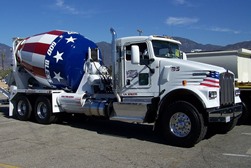How to Select the Best Trucking Classes near Birmingham Alabama
 Congrats on your decision to become a truck driver and enroll in a trucking school near Birmingham AL. Maybe it has always been your fantasy to hit the open road while driving a big ole tractor trailer. Or possibly you have conducted some analysis and have found that an occupation as a truck driver provides good income and flexible work opportunities. Regardless of what your reason is, it's essential to get the appropriate training by choosing the right CDL school in your area. When reviewing your options, there are a number of factors that you'll want to examine before making your final choice. Location will no doubt be important, especially if you have to commute from your Birmingham residence. The cost will also be of importance, but selecting a school based only on price is not the optimal means to make certain you'll get the right training. Don't forget, your goal is to master the knowledge and skills that will enable you to pass the CDL examinations and become a professional truck driver. So keeping that goal in mind, just how do you decide on a truck driving school? That is what we are going to address in the rest of this article. But first, we are going to review a little bit about which CDL license you will ultimately need.
Congrats on your decision to become a truck driver and enroll in a trucking school near Birmingham AL. Maybe it has always been your fantasy to hit the open road while driving a big ole tractor trailer. Or possibly you have conducted some analysis and have found that an occupation as a truck driver provides good income and flexible work opportunities. Regardless of what your reason is, it's essential to get the appropriate training by choosing the right CDL school in your area. When reviewing your options, there are a number of factors that you'll want to examine before making your final choice. Location will no doubt be important, especially if you have to commute from your Birmingham residence. The cost will also be of importance, but selecting a school based only on price is not the optimal means to make certain you'll get the right training. Don't forget, your goal is to master the knowledge and skills that will enable you to pass the CDL examinations and become a professional truck driver. So keeping that goal in mind, just how do you decide on a truck driving school? That is what we are going to address in the rest of this article. But first, we are going to review a little bit about which CDL license you will ultimately need.
Which CDL Will You Need?

In order to operate commercial vehicles lawfully within the United States and Birmingham AL, a driver must attain a CDL (Commercial Driver's License). The three license classes that one can apply for are Class A, Class B and Class C. Given that the subject of this article is how to select a truck driving school, we will focus on Class A and B licenses. What distinguishes each class of CDL is the type of vehicle that the driver can operate together with the GVWR (Gross Vehicle Weight Rating) or GCWR (Gross Combination Weight Rating). Following are brief descriptions for the two classes.
Class A CDL. A Class A Commercial Drivers License is needed to drive any vehicle that has a GCWR of more than 26,000 lbs., including a towed vehicle of greater than 10,000 lbs. Some of the vehicles that operators may be able to drive with Class A licenses are:
- Interstate or Intrastate Tractor Trailers
- Trucks with Double or Triple Trailers
- Tanker Trucks
- Livestock Carriers
- Class B and Class C Vehicles
Class B CDL. A Class B CDL is required to operate single vehicles having a GVWR of greater than 26,000 lbs., or a GCWR of greater than 26,000 lbs. including a towed vehicle weighing up to 10,000 lbs. A few of the vehicles that operators may be qualified to drive with Class B licenses are:
- Tractor Trailers
- Dump Trucks
- Cement Mixers
- Large Buses
- Class C Vehicles
Both Class A and Class B Commercial Drivers Licenses might also need endorsements to operate certain types of vehicles, for example passenger or school buses. And a Class A license holder, with the proper required endorsements, can drive any vehicle that a Class B licensee is authorized to drive.
How to Assess a Trucking School

Once you have decided which CDL you want to pursue, you can begin the undertaking of evaluating the Birmingham AL trucking schools that you are looking at. As already mentioned, cost and location will certainly be your primary concerns. But it can't be emphasized enough that they should not be your only considerations. Other issues, including the experience of the instructors or the reputations of the schools are similarly if not more important. So following are a few more factors that you need to research while performing your due diligence before selecting, and especially paying for, your truck driver training.
Are the Schools Certified or Accredited ? Not many trucking schools in the Birmingham AL area are accredited due to the demanding process and cost to the schools. On the other hand, certification is more commonplace and is provided by the Professional Truck Driver Institute (PTDI). A school is not required to become certified, but there are certain advantages. Potential students recognize that the training will be of the highest caliber, and that they will get plenty of driving time. For example, PTDI requires 44 hours of actual driving time, not ride-alongs or simulations. So if a school's program is certified (the program, not the school is certified), students know that the curriculum and training will fulfill the very high standards set by PTDI.
How Long in Business? One clue to help evaluate the quality of a trucking school is how long it has been in business. A poorly rated or a fly by night school typically will not be in business very long, so longevity is a plus. On the other hand, even the best of Birmingham AL schools had to start from their opening day of training, so consider it as one of several qualifiers. You can also ask what the school's history is pertaining to successful licensing and job placement of its graduating students. If a school won't provide those stats, search elsewhere. The schools should also have relationships with local and national trucking firms. Having a large number of contacts not only points to a superior reputation within the trade, but also boosts their job assistance program for students. It also wouldn't be a bad idea to get in touch with the Alabama licensing department to make sure that the CDL trucker schools you are considering are in compliance.
How Effective is the Training? As a minimum requirement, the schools should be licensed in Alabama and hire instructors that are trained and experienced. We will cover more about the instructors in the following segment. In addition, the student to instructor ratio should be no higher than 4 to 1. If it's any higher, then students will not be getting the personal attention they will need. This is especially true regarding the one-on-one instruction for behind the wheel training. And look out for any school that insists it can teach you to drive trucks in a comparatively short time period. Learning to be a truck driver and to drive a tractor trailer skillfully requires time. The majority of Birmingham AL schools offer training programs that run from three weeks to as long as 2 months, based on the class of license or type of vehicle.
How Experienced are the Instructors? As previously mentioned, it's important that the instructors are qualified to teach driving methods and experienced as both drivers and instructors. Although a number of states have minimum driving time criteria to qualify as an instructor, the more professional driving experience a teacher has the better. It's also crucial that the instructors stay up to date with industry developments or any new regulations or changes in existing laws. Assessing instructors may be a little more subjective than other standards, and perhaps the ideal method is to visit the school and speak with the teachers face to face. You can also speak with a few of the students going through the training and find out if they are satisfied with the quality of instruction and the teacher's qualification to train them.
Plenty of Driving Time? Most importantly, a great trucking school will furnish lots of driving time to its students. Besides, isn't that what it's all about? Driving time is the real time spent behind the wheel operating a truck. Even though the use of ride-a-longs with other students and simulators are important training tools, they are no substitute for real driving. The more training that a student receives behind the wheel, the better driver he or she will become. Although driving time varies among schools, a good benchmark is a minimum of 32 hours. If the school is PTDI certified, it will provide a minimum of 44 hours of driving time. Contact the Birmingham AL schools you are researching and find out how much driving time they furnish.
Are they Captive or Independent ? It's possible to obtain free or discounted training from a number of trucking schools if you make a commitment to drive for a specified carrier for a defined time period. This is called contract training, and the schools that provide it are called captives. So rather than maintaining affiliations with a wide range of trucking lines that they can place their graduates with, captives only refer to one company. The benefit is receiving free or less expensive training by surrendering the freedom to initially work wherever you have an opportunity. Obviously contract training has the potential to limit your income prospects when beginning your new career. But for some it may be the ideal way to obtain affordable training. Just make sure to inquire if the Birmingham AL schools you are considering are captive or independent so that you can make an informed decision.
Provide CDL Testing Onsite? There are a number of states that will allow 3rd party CDL testing onsite of truck driving schools for its students. If onsite testing is permitted in Alabama, find out if the schools you are reviewing are DMV certified to offer it. One benefit is that it is more accommodating than competing with graduates from competing schools for test times at Alabama testing locations. It is also an indicator that the DMV considers the approved schools to be of a higher quality.
Are the Class Times Convenient? As earlier mentioned, truck driving training is just one to two months long. With such a short duration, it's important that the Birmingham AL school you choose provides flexibility for both the scheduling of classes and the curriculum. For example, if you're having a hard time learning a particular driving maneuver, then the teacher should be willing to commit more time with you until you are proficient. And if you're still employed while attending training, then the class scheduling needs to be flexible enough to accommodate working hours or other commitments.
Is Job Placement Provided? The moment you have attained your commercial driver's license after graduating from truck driver school, you will be anxious to start your new career. Verify that the schools you are contemplating have job assistance programs. Find out what their job placement percentage is and what average salary their graduates start at. Also, find out which national and local trucking companies their graduates are referred to for hiring. If a school has a poor job placement rate or not many Birmingham AL employers hiring their grads, it might be a clue to look elsewhere.
Is Financial Aid Provided? Truck driver schools are similar to colleges and other Birmingham AL area vocational or trade schools when it comes to loans and other forms of financial aid being offered. Ask if the schools you are assessing have a financial aid department, or at a minimum someone who can help you understand the options and forms that must be completed.
Learn More About Birmingham Trucker Schools
Choose the Best Birmingham AL Truck Driver Training
Choosing the appropriate trucking school is an important first step to beginning your new vocation as a long distance or local truck driver. The skills taught at school will be those that mold a new career behind the wheel. There are several options available and understanding them is vital if you are going to succeed as an operator. But first and foremost, you must obtain the appropriate training in order to drive a big commercial vehicle in a professional and safe fashion. If you are short on cash or financing, you might need to think about a captive school. You will pay a reduced or in some cases no tuition in exchange for driving for their contracted carrier. Or you can select an independent trucker school and have the the freedom to drive for the trucking firm of your choice, or one of many affiliated with the school. It's your choice. But no matter how you receive your training, you will in the near future be part of a profession that helps America move as a professional truck driver in Birmingham AL.
